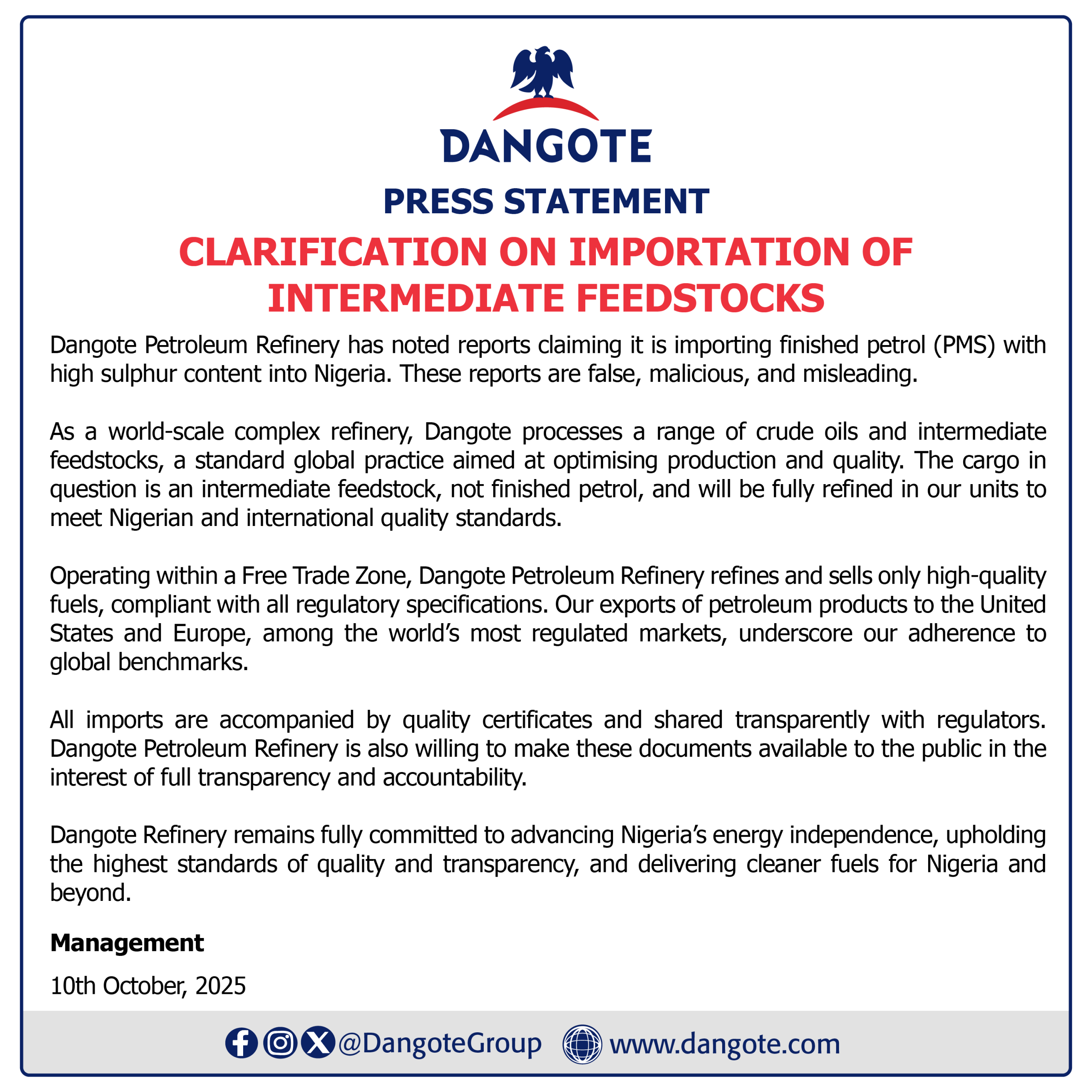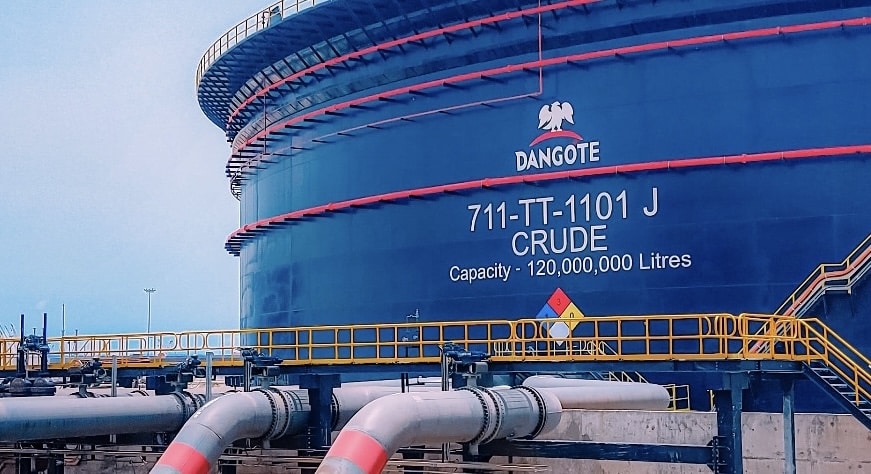Amid a swirl of controversy and public concern, Dangote Refinery has publicly rejected reports alleging that it was responsible for importing so-called ‘dirty’ petrol—fuel with excessive sulphur content—from the United Kingdom into Nigeria. This issue has ignited debate among Nigerians, regulators, and industry experts about the nation’s fuel quality standards and the integrity of local oil supply chains.
In a statement released on Friday, the management of Dangote Refinery described the recent media stories as “false, malicious, and misleading.” The company specifically addressed allegations that it is importing finished petroleum products with sulphur levels above legal thresholds, asserting its operations are compliant with both Nigerian and international regulations.
These denials come after investigative reports emerged claiming Dangote Refinery had allegedly imported a shipment of petrol—labelled as “High-Sulphur Catalytic Gasoline”—from the UK that contains 690 parts per million (ppm) of sulphur. For context, Nigeria’s Clean Fuels policy sets the national limit for sulphur content at just 50 ppm, aligning with regional efforts to improve air quality and public health. The allegations triggered widespread anxiety about product quality, environmental dangers, and the sufficiency of government oversight.
According to the media reports, internal shipping documents purportedly show that this import far exceeded Nigeria’s legal limit, raising fears of environmental health risks if such fuel were to reach local filling stations. However, Dangote Refinery’s spokesperson categorically denied any breach of legal or safety standards, stressing that the cargo in question was “an intermediate product, not finished petrol,” and would undergo further refining within the company’s facilities to meet all quality benchmarks before reaching Nigerian consumers.
Addressing the public directly, Dangote Refinery reaffirmed its commitment to “upholding the highest standards of quality and transparency,” promising Nigerians and neighboring West African countries cleaner, safer fuels. The statement emphasized that finished products leaving Dangote’s facility are, and will continue to be, fully compliant with Nigeria’s sulphur regulations as well as international standards.
The Nigerian fuel market has long battled with issues related to product quality and regulatory enforcement. Past scandals—such as the notorious toxic petrol episode of 2022, which caused major disruption across the nation—have heightened public vigilance and placed renewed scrutiny on oil importers and refiners. Activists and environmental groups regularly urge for stricter monitoring, warning of the health impact of high-sulphur fuels which can increase respiratory diseases, especially in vulnerable populations.
Industry experts note that sulphur-laden petrol is a persistent problem across many African countries. According to Dr. Adebayo Ogunleye, an energy policy analyst based in Lagos, “The transition to low-sulphur fuels is critical for Nigeria’s air quality and citizens’ health. Any move backwards, whether through imports or loose oversight, threatens hard-won progress.” He continued, “Refineries like Dangote’s hold a pivotal role—not just producing, but policing the standards the country depends on.”
Some local community leaders in the Niger Delta, where oil refining is both an economic mainstay and an environmental risk, echoed these concerns. “We deserve clean fuel, not the cast-offs of other countries,” noted Chief Moses Ibe, an environmental advocate based in Warri. Grassroots groups have called on regulators such as the Nigerian Midstream and Downstream Petroleum Regulatory Authority (NMDPRA) to increase transparency and carry out regular, independent testing.
The regulatory landscape, meanwhile, is complex. While standards exist, implementation can be inconsistent, as acknowledged by several former officials of the Department of Petroleum Resources (DPR). Some flagged gaps in port inspections and periodic lapses in quality checks, which have previously allowed sub-standard fuel consignments into Nigeria’s supply chain.
Dangote Refinery’s emergence has generated significant hope for improved self-sufficiency in fuels for Nigeria and the West African region. Since its commissioning, it has positioned itself as a key player intent on reducing reliance on imports and delivering world-class products. Nonetheless, questions remain about whether it—and the regulatory systems overseeing it—can consistently match the best practices seen in countries like South Africa and Morocco, both of which have made notable progress in reducing sulphur content in fuels.
From a legal standpoint, importing fuel with excess sulphur into Nigeria is prohibited under national law and carries severe consequences, including seizure, fines, and potential legal action, according to Ms. Esther Ekanem, a Lagos-based environmental lawyer. “The law is clear,” she remarked in a phone interview. “If finished petrol exceeds the sulphur cap, regulators must act. But the situation is complicated for intermediates, which are commonly refined further before public distribution.”
According to market data from the African Refiners and Distributors Association (ARDA), over 40% of West Africa’s imported fuel in 2023 had sulphur rates above recommended limits, with Nigeria among the countries working hardest to tighten controls. Progress has been made, but as this recent incident illustrates, continuous vigilance is required—from industry, government, and citizens alike.
So far, regulators have not issued sanctions against Dangote Refinery over this allegation, and public confidence in the company’s compliance remains a topic of heated debate in business circles, on social media, and among ordinary citizens at filling stations from Lagos to Kano.
As Nigeria strives to balance the demands of economic growth with environmental protection, the ongoing conversation about fuel quality will remain central. West Africa, as a whole, faces similar challenges and opportunities—making Nigerian reforms potentially influential beyond its borders.
Industry observers await further statements or investigative findings from the government. Meanwhile, experts recommend that citizens remain alert, demand transparency, and continue to push for cleaner energy solutions.
How do you feel about Nigeria’s efforts to ensure clean and safe fuel for all citizens? Do you trust our regulations and local refineries to uphold the highest quality standards? Share your perspective in the comments, and don’t forget to follow us for ongoing updates about fuel standards, local refinery developments, and more.

For general support, questions, or feedback, write to support@nowahalazone.com.
Follow the conversation! Stay updated with the latest in Nigerian and African news by joining us on Facebook, X (Twitter), and Instagram.
Have a tip or opinion? Drop a comment below or reach out directly. Your story could be next!










